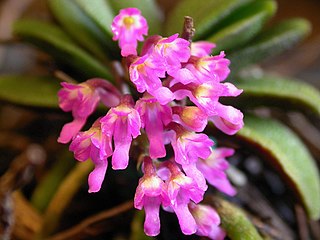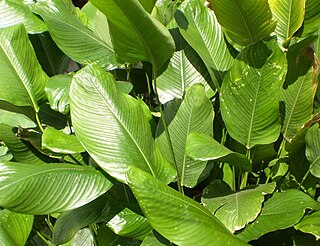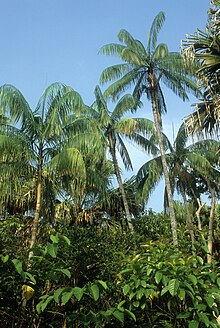
Salacca is a genus of about 20 species of palms native to Southeast Asia and the eastern Himalayas.

Cryptocoryne is a genus of aquatic plants from the family Araceae. The genus is naturally distributed in tropical regions of India, Southeast Asia and New Guinea.

Antidesma is a genus of tropical plant in the family Phyllanthaceae formally described by Linnaeus in 1753. It is native to tropical Africa, S + E + SE Asia, Australia, and various oceanic islands. The greatest diversity occurs in Southeast Asia.

Mallotus is a genus of the spurge family Euphorbiaceae first described as a genus in 1790. Two species are found in tropical Africa and Madagascar. All the other species are found in East Asia, the Indian Subcontinent, Southeast Asia, eastern Australia, and certain islands of the western Pacific.
Trigonostemon is a plant genus of the family Euphorbiaceae and the sole member of its tribe (Trigonostemoneae). It was first described as a genus in 1826. It is native to Southeast Asia, southern China, the Indian Subcontinent, Queensland, and a few islands in the western Pacific.
Paracroton is a genus of flowering plants in the Euphorbiaceae first described as a genus in 1859. It is native to South and Southeast Asia, as well as New Guinea.
- Paracroton integrifolius(Airy Shaw) N.P.Balakr. & Chakr. - Kerala, Tamil Nadu
- Paracroton pendulus(Hassk.) Miq. - India, Sri Lanka, Myanmar, Thailand, Malaysia, Borneo, Sumatra, Philippines
- Paracroton sterrhopodus(Airy Shaw) Radcl.-Sm. & Govaerts - W New Guinea
- Paracroton zeylanicus(Müll.Arg.) N.P.Balakr. & Chakr. - Sri Lanka

Agrostistachys is a plant genus of the family Euphorbiaceae first described as a genus in 1850. It is native to Southeast Asia, New Guinea, India, and Sri Lanka.
- Agrostistachys borneensisBecc. - India, Sri Lanka, Thailand, Vietnam, Malaysia, Borneo, Philippines, Sumatra, New Guinea
- Agrostistachys gaudichaudiiMüll.Arg. - Thailand, Peninsular Malaysia
- Agrostistachys hookeri(Thwaites) Benth. & Hook.f. - Sri Lanka
- Agrostistachys indicaDalzell - India, Sri Lanka, Thailand, Vietnam, Myanmar, Laos, Cambodia, Malaysia, Borneo, Philippines, New Guinea
- Agrostistachys sessilifolia(Kurz) Pax & K.Hoffm. - Peninsular Malaysia, Borneo, Sumatra
- Agrostistachys staminodiataSevilla - Sumatra

Dimorphocalyx is a genus of plants under the family Euphorbiaceae first described as a genus in 1861. It is native to Southeast Asia, Hainan, India, Sri Lanka, New Guinea, and Queensland.

Aporosa is a genus of flowering plant belonging to the family Phyllanthaceae first described as a genus in 1825. It is native to China, the Indian Subcontinent, Southeast Asia, Papuasia, and Queensland.

Cleistanthus is a plant genus of the family Phyllanthaceae, tribe Bridelieae, first described as a genus in 1848. It is widespread in much of the Old World Tropics in Asia, Africa, Australia, and various oceanic islands. Cleistanthus collinus is known for being toxic and may be the agent of homicides or suicides.

Drypetes is a plant genus of the family Putranjivaceae, in the order Malpighiales.

Daemonorops is a genus of rattan palms in the family Arecaceae found primarily in the tropics and subtropics of southeastern Asia with a few species extending into southern China and the Himalayas.

Arenga is a genus of palms, native to Southeast Asia, southern China, New Guinea, and northern Australia. They are small to medium-sized palms, growing to 2–20 m tall, with pinnate leaves 2–12 m long. Arenga palms can grow in areas with little sunlight and relatively infertile soil.

Pothos is a genus of flowering plants in the family Araceae. It is native to China, the Indian Subcontinent, Australia, New Guinea, Southeast Asia, and various islands of the Pacific and Indian Oceans.
Pholidocarpus is a genus of flowering plant in the family Arecaceae, native to Southeast Asia. It contains the following species:

Plectocomia is a genus of flowering plant in the family Arecaceae native to China, the Himalayas, and Southeast Asia. It contains the following known species:

Pteroceras is a genus of flowering plants from the orchid family, Orchidaceae. It is native to China, the Indian Subcontinent, and Southeast Asia.

Schoenorchis, commonly known as flea orchids, or 匙唇兰属 , is a genus of flowering plants from the orchid family, Orchidaceae. Plants in this genus are small epiphytes with thin roots, thin leafy stems with leaves in two ranks and tiny fragrant, almost tube-shaped flowers with a prominently spurred labellum. There are about twenty five species found from tropical and subtropical Asia to the Western Pacific.

Sciaphila is a genus of mycoheterotrophic plants in the family Triuridaceae. These plants receive nutrition from fungi and neighboring trees and have less need for photosynthesis. It is widespread in tropical and subtropical regions, found in Africa, China, Japan, the Indian Subcontinent, Southeast Asia, Latin America and on various islands Pacific Islands.

Stachyphrynium is a genus of plants native to China, the Indian Subcontinent, and Southeast Asia. It was first described as a genus with this name in 1902.

















